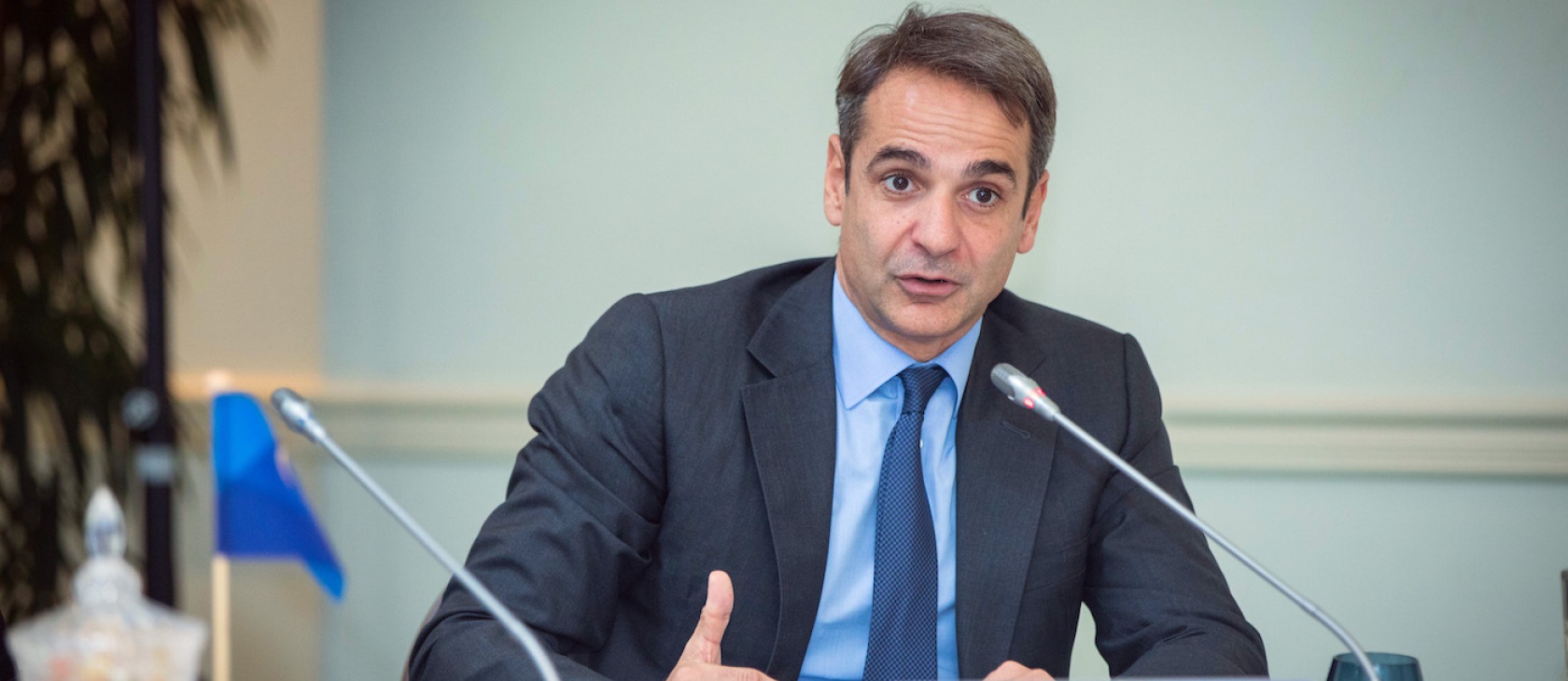On Monday, the leadership of the anti-austerity populism passed definitively to Matteo Salvini of Italy, as Kyriakos Mitsotakis was sworn in as the prime minister of Greece. Mitsotakis, the son of former Prime Minister Konstantinos Mitsotakis, displaced Alexis Tsipras of the left-wing ruling party, Syriza (literally “the Coalition of the Left”), on a platform of lower taxes, deregulation, and unleashing the free market.
Mitsotakis’ center-right New Democracy Party won a landslide in Sunday’s elections, securing an outright majority of 158 of parliament’s 300 seats. (In the Greek political system 250 seats are contested, and the winning party receives an additional 50 seats.)
The centrist prime minister, who graduated from Harvard Business School before working in banking, gave a victory speech that all but promised to make Greece great again. “I want a strong Greece with self-confidence,” he said, not one that interacts with Europe as “a beggar or a poor relative.”
Greek youth embrace the free market
New Democracy nearly doubled its share of the youth vote. That may be in part due to the indefatigable educational campaigns conducted at all levels of society by the Center for Liberal Studies (KEFiM), led by energetic new president Alexander Skouras. KEFiM also enjoys close ties to some members of New Democracy, which will provide a more welcome audience for the think tank’s “Greece 2021 – Agenda for Freedom and Prosperity.”
But the largest factor has been cold, hard reality. In 2019, Greece ranked between Cambodia and Nicaragua in the Heritage Foundation’s Index of Economic Freedom. The result is a 40 percent youth unemployment rate that has sent nearly half-a-million young Greeks emigrating since 2010, and a population soured on Syriza’s leftist economic policies.
Young Greeks today understand that the free market holds the key to their economic future. “We must focus on the private sector in order to get better economically,” 22-year-old Tasos Stavridis told the BBC. “Our public sector is inefficient and lazy.”
Tsipras did much to convince his citizens that the public sector is duplicitous, as well. His coalition includes Maoists and Trotskyites, and several members of the Syriza coalition had ties to Russian theorist Alexander Dugin, whose Eurasianism seeks to create a countervailing center of power to the Atlanticists. Tsipras promised the era of foreign-imposed austerity would come to an end.
Then, Syriza’s governing coalition engaged in a reversal that “would bedazzle even the most speculative Hegelian philosopher,” according to leftist philosopher Slavoj Žižek. In power, Prime Minister Tsipras hiked taxes on ordinary people multiple times, cut pension benefits, increased the price of diesel, raised the retirement age, and slashed other benefits. “Syriza became the purveyor of injustice,”said one UK leftist living in Greece.
To deepen the betrayal, the “populist” Tsipras held a national referendum on accepting the conditions of an EU bailout package. Like David Cameron's Brexit referendum, Tsipras is said to have believed the plebiscite would carry, only to see his people decisively reject it. He then announced he would ignore the result and implement the EU’s stipulations the next day.
Tsipras could have realized the dead end of Syriza’s radicalism, or he may have fallen victim to “the inevitable result of the EU’s anti-democratic architecture.”
Syriza’s stewardship of Greek finances proves the veracity of the biblical warning: “The borrower is servant to the lender” (Proverbs 22:7). That maxim will prove pivotal for the incoming administration, which faces a national debt that amounts to 180 percent of GDP and Syriza as its leading opposition party.
Understanding the political spectrum
A second positive comes in the fact that the Golden Dawn Party, which had a decidedly neo-fascist ethos, lost its place in parliament after it failed to gain three percent of the vote (by three hundredths of one percent).
This opens an opportunity to properly understand the New Democracy’s supporters propose a political spectrum similar to that advocated by Fr. Robert Sirico at the closing plenary session of this year’s Acton University. In this conception, anarchy is on the extreme right and all forms of totalitarianism make up the extreme left. Erik von Kuehnelt-Leddihn advanced a similar understanding when he described “all forms of national collectivism and statism … socialism and communism, fascism, and national socialism” as “leftism in all its modern guises.” As ND applies this to its own situation, in the words of Greek journalist Augustine Zenakos. “Syriza and Golden Dawn are presented as equal dangers to democracy.” Mitsotakis called Golden Dawn’s rout “an important victory for Europe, not just for Greece.”
France and Greece: A new Entente des Banquiers?
Greece’s relationship with the EU will likely improve, particularly with France, which sees its own failings magnified in Athens. “Greece is sort of an exaggerated image of what we are ourselves” said French economist Jean Pisani-Ferry.“There’s a sort of permanent hesitation about whether we in fact feel we’re Greeks or we feel we’re creditors.”
A well-heeled banker now leads both nations. In Macron – a europhile who, like our Heavenly Father, is unwilling that anyone should be left out of his glorious kingdom – Mitsotakis is likely to find a friend in Brussels.
Despite the change in leadership, the nation’s greatest economic obstacle – its political culture – remains unchanged. If the U.S. experience is any indication, economic interventionism will not be discredited – and free market capitalism will win no converts – even if Mitsotakis succeeds. The Left’s familiar refrain has been that their economic program has never been tried, all the more so in the case of Syriza imposing austerity.
A culture of entrepreneurship and efficient bureaucracy has not taken root. This election is not the end of entrenched cronyism and family favoritism, not even the beginning of the end.
But it may be the end of elitist, austerity populism.
(Photo credit: European People’s Party. This photo has been cropped. CC BY 2.0.)














